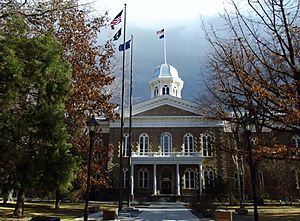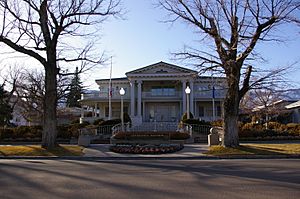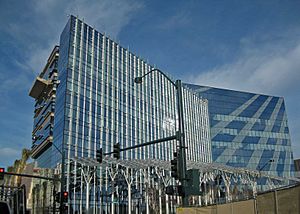Government of Nevada facts for kids
The government of Nevada works like a team with three main parts. These parts are called "branches." They are the executive branch (like the state's boss, the governor of Nevada), the legislative branch (who make the laws, called the Nevada Legislature), and the judicial branch (who make sure laws are fair, like the Supreme Court of Nevada). This setup helps make sure no one part has too much power.
Contents
Nevada's Executive Branch
The executive branch is led by the Governor. It also includes the Governor's special team, called the cabinet, and other elected officials who help run the state.
The Governor's Role
The Governor of Nevada is like the state's chief manager. They are in charge of the executive department and the leader of Nevada's military forces, the Nevada National Guard.
The Governor's main jobs include making sure state laws are followed. They can also approve or reject new laws passed by the Nevada Legislature. The Governor can call the Legislature together for special meetings. They also have the power to forgive certain crimes, except for very serious ones like treason.
A Governor serves for four years. To become Governor, a person must be at least 25 years old. They also need to have lived in Nevada for at least two years before the election.
The current Governor is Joe Lombardo, who is a Republican.
Other Elected Officials
Nevadans also vote for five other important statewide officials every four years. These elections happen at the same time as the Governor's election. These officials include the Lieutenant Governor, Secretary of State, State Treasurer, State Controller, and Attorney General.
These officials have their own jobs and powers. They work independently from the Governor and the Legislature.
Currently, the Lieutenant Governor is Stavros Anthony (Republican). The Attorney General is Aaron D. Ford (Democrat). The Secretary of State is Cisco Aguilar (Democrat). The Treasurer is Zach Conine (Democrat), and the Controller is Andy Matthews (Republican).
The Governor's Cabinet
The Governor's cabinet is a group of advisors. They help the Governor with state business. The cabinet is made up of the leaders of different state agencies. The Governor chooses these leaders.
The cabinet includes people like:
- Lieutenant Governor
- Director of the Nevada Department of Agriculture (deals with farming)
- Director of the Nevada Department of Business and Industry (helps businesses)
- Director of the Nevada Department of Conservation and Natural Resources (protects nature)
- Director of the Nevada Department of Corrections (runs prisons)
- Director of the Nevada Department of Tourism and Cultural Affairs (promotes tourism and culture)
- Superintendent of Public Instruction for the Nevada Department of Education (oversees schools)
- Director of the Department of Health and Human Services (helps with health and welfare)
- Director of the Nevada Department of Motor Vehicles (DMV, handles driver's licenses and car registrations)
- Adjutant General of the Nevada National Guard (leads the state's military)
- Director of the Nevada Department of Public Safety (DPS, state police and safety)
- Director of the Nevada Department of Transportation (NDOT, manages roads and transport)
- Director of the Nevada Department of Wildlife (protects animals and habitats)
Important State Agencies
Nevada has many agencies that help run the state. Some important ones include:
- Nevada Gaming Control Board (regulates casinos and gambling)
- Department of Health and Human Services (provides health and social services)
- Department of Taxation (collects state taxes)
- Public Utilities Commission (regulates services like electricity and water)
Nevada's Legislative Branch

The Nevada Legislature is the part of government that makes laws. It has two parts: the Nevada Assembly and the Nevada Senate. This is called a "bicameral" system.
Members of the Assembly serve for 2 years. Members of the Senate serve for 4 years. There is a limit on how long someone can serve in each house. A person can serve a maximum of 12 years in the Assembly and 12 years in the Senate over their lifetime.
The Legislature meets for 120 days every two years, in odd-numbered years. The Governor can call them back for special meetings if needed.
Right now, the Democratic Party has more members in both the Assembly and the Senate.
In 2018, Nevada made history. It was the first state where women held more than half the seats in the Legislature!
Nevada's Judicial Branch
The judicial branch is made up of courts. Their job is to interpret laws and make sure justice is served.
The highest court in Nevada is the Supreme Court of Nevada. Below that are the Nevada District Courts, which handle most major cases. There are also smaller courts, like Justice Courts and Municipal Courts, which handle less serious cases.
Local Government in Nevada
Local government means how cities and towns are run.
Incorporated Cities
In Nevada, towns that are "incorporated" are called cities. These cities can make their own laws as long as those laws are not against state law. There's a movement to give these cities more "home rule." This would give them more freedom and fewer rules from the state Legislature.
Unincorporated Towns
"Unincorporated towns" are places that are mostly run by the county they are in. However, people in these towns can choose to form small local governments. These can be a Town Advisory Board (TAB), a Citizens Advisory Council (CAC), or a Town Board.
Town Advisory Boards and Citizens Advisory Councils
These boards are created by the county. They usually have three to five members. These members are elected for two-year terms. Their job is to give advice to the county about their town. They don't have their own money or budget. They just offer ideas and opinions.
Town Boards
Town Boards are a bit more powerful than advisory boards. They have five members elected for four-year terms. The board chooses a chairperson and a clerk from its members.
Town Boards also mostly give advice, but they have more say in how their town is run. Their money comes from the county. The county can even ask the town's residents to vote on whether to keep or get rid of a Town Board. Town Boards can also hire a town manager to help them.
See also
- List of Nevada state agencies
 | John T. Biggers |
 | Thomas Blackshear |
 | Mark Bradford |
 | Beverly Buchanan |



